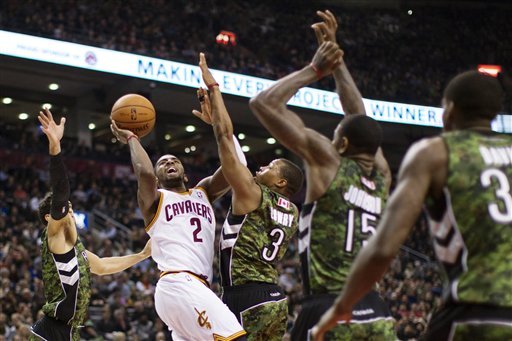If you’re trying to figure out what is being done differently on defense this year, one of the things that might come to your mind is the increased pressure being put on opposing point guards at the onset of a play. Casey’s tried to shorten the clock by applying increased pressure at the point, shaving valuable ticks off the clock and producing undesirable options for the offense.
In today’s segment I’ll point out a play late in the Charlotte game, where Casey deployed the “PG trap” twice on one play. The first time it worked, the second time it failed due to late recovery. The point here is that if you’re playing this kind of defense, you need agile athletes who can do what is very difficult to do in the NBA: cover ground. There’s a reason he wanted Tyson Chandler, it’s exactly in situations like these.

Here’s a pick being set on Jose Calderon. Ed Davis will come out to trap DJ Augustin instead of taking the two “traditional” options of 1) getting back to his man, DJ White, and 2) laying off the guard, thus preventing the drive and perhaps rely on a rotation to pick DJ White up.

Notice the distance between Ed and White, who is wide open (although Amir Johnson is in a potential help situation, but nowhere close to contest a jumper). Charlotte chooses to swing the ball to the other side because Jose Calderon is positioned well and is preventing a quick, zip pass back to White. If Augustin had to make this pass, it would have to be a lob which would take longer to execute, allowing greater time for defensive recovery.

Ed Davis has managed to get back, and Charlotte is now running the play again on the other side of the court with Kemba Walker, with Amir Johnson being asked to perform the same task as what Davis just did – trap/hedge and recover.

Notice how far Amir Johnson is from his man, Boris Diaw, at this point. He has a lot of ground to cover to get back, and even if Ed Davis rotates over to help, it creates a 2-on-1 situation very close to the rim.

This is probably the point where Johnson made his only mistake: he ball-watched instead of continuing on his track back to Diaw. If he had stuck to his assignment, Barbosa would have contested any shot from the shorter Walker, which would’ve been uncomfortable in any case since Johnson was right around his side of the rim.

The short pass from Kemba Walker to Boris Diaw is converted for a jumper as Johnson is a split-second too late.
The play in its entirety:
In a two point game late in the fourth, it’s always the small stuff that wins or loses the game.
Win free tickets from RR to watch plays like the above in action.


